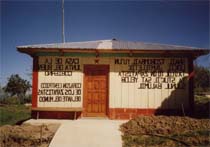Stepping off the bus in Chiapas was like crossing a border.
We found ourselves in a Mexico very different than the one we’d experienced in the prosperous city of Guadalajara, where the three of us spent the last four months with Guilford’s study abroad program. We traded the world of hair gel, designer jeans and high-heeled shoes for a place where the women wore long braids woven with ribbons, homespun wool skirts, embroidered blouses, and jelly sandals.
The Spanish skills we acquired after four months in Guadalajara were suddenly useless; the conversations around us were in Tzotzil, Tzeltal and Chol. Mexico’s underdevelopment, so carefully hidden in Jalisco, was painfully obvious in Chiapas. This was poverty.
From the window of the collective taxi, we saw little wooden houses built on the slope of the mountains – very different from the houses of our middle-class host families.
Life in the mountains happens within sight of the highway. We saw people working and playing in their yards only feet away from the two-lane paved highway. Houses clustered around small general stores just off the road, freshly painted with Coca-Cola and Pepsi logos.
The taxi dropped us off on the side of the highway in front of a sign that said: “You are in rebel territory. Here the people command and the government obeys.”
We had arrived at Oventic, a politically autonomous village in the Southeastern Mexican state of Chiapas. At the gate, a young woman took our passports and asked us to wait while she announced our arrival to the Junta de Buen Gobierno.
We had studied about the formation of these autonomous communities and the Junta de Buen Gobierno that govern them in our Community Development class back in Guadalajara.
Although these communities are considered rebellious by the Mexican government, we were impressed by their dedication to true democracy; men, women and children all have a voice and a vote in the decisions made. The structure of the local government in the autonomous communities is based on the model of an inverted pyramid. Instead of the commands coming from the few leaders at the top and being carried out by the masses at the bottom, the people identify their needs and suggest solutions.
After 30 minutes, the woman returned and led us to the welcoming committee of the Junta de Buen Gobierno, housed in a rustic wooden-plank building. Two men sporting balaclavas greeted us and led us behind the building where we could more comfortably discuss the nature of our visit. Seated in the sun on a hand-hewn bench leaning against the outside wall of the building, the two masked men taught us about the ideology behind the movement.
“It’s not like we rose up because we are crazy. There was no other solution. The [Mexican] government does not respect us. We are not respected as Indigenous people. We are not permitted the right to live like we should.”
Ten years ago, the government did not provide the same services in the indigenous communities of rural Chiapas as they did in non-indigenous communities. At this time, the struggle in rural indigenous communities centered around two demands: education and health. Without this base they felt nothing could be changed.
The movement started as a response to this need, but as they organized, they began to realize that indigenous peasants in Chiapas were not the only Mexicans ignored by the government. At one point, in closed-door negotiations, government representatives actually offered to fulfill most of the original demands of the rebels to improve the infrastructural needs of their communities. .
But community members feared that if they accepted these concessions they would be selling out. They didn’t just want the community they personally lived in to have these things; they saw them as inalienable human rights. They had been reduced to begging the government for nothing more than what every Mexican citizen deserves. They saw that poor people all over the country were facing a common enemy, and the movement changed from a simple movement for services like paved roads, running water, schools and clinics, to a complex struggle for true democracy and self-government. The aphorism, “para todos todo, nada para nosotros” (for all everything, nothing for us) summarizes this principle.
Tired of waiting for the government to make good on the promises made in the San Andreas treaty (signed in 1996), they decided to act as if the government had been true to its word. The Mexican government promised: “the indigenous peoples shall be able to decide their own form of internal government as well as decide their way of organizing themselves politically, socially, economically and culturally,” and that is just what they did.
They began to set up a new social system, developing their own governing councils that put into practice the traditional Mayan philosophy of “mandar obedeciendo,” or to govern by obeying in their municipalities modeled after the inverted pyramid. Real change began to happen, and women took leading roles in the governance. With no help from the government, they opened schools and medical clinics, and organized production cooperatives.
Although the movement is about indigenous autonomy, it has never been based on isolationism. Without financial support from the government, the social reformers turned to solidarities groups from as close as Mexico City and as far away as Tokyo to fund their projects. Thousands of people from all over the world come to visit Oventic each year.
“[These] visitors strengthen our resolve, they energize us,” they told us. “We are fighting not just for the indigenous but for all. Globalizing is good, not globalization to screw over the people but to defend our rights. We all have a common enemy, the Neoliberalism of those on top, of the United States. Not you [the citizens] but the government. We know that there are poor people all over the world that live like us and we have to organize ourselves to move for -ward.”

